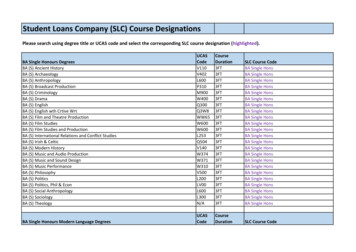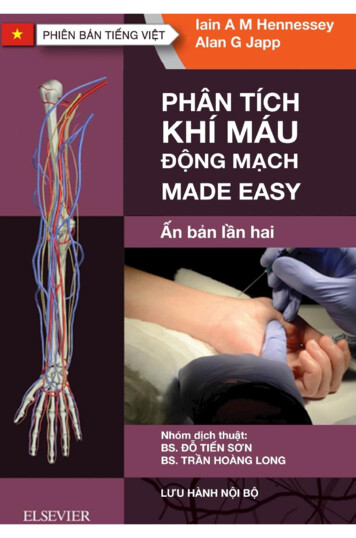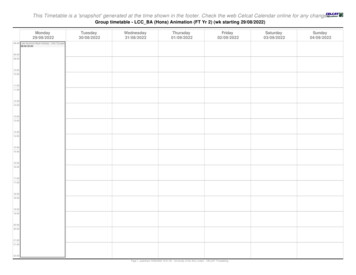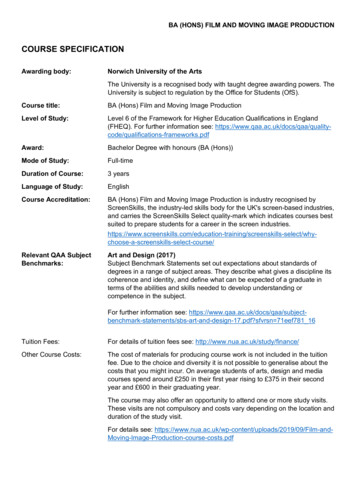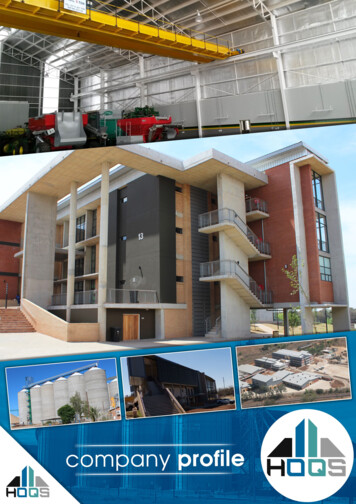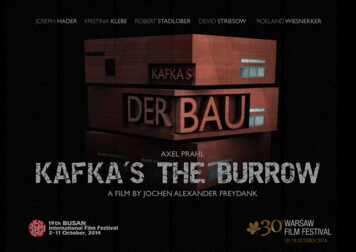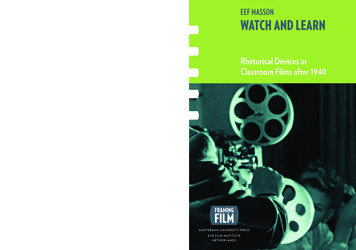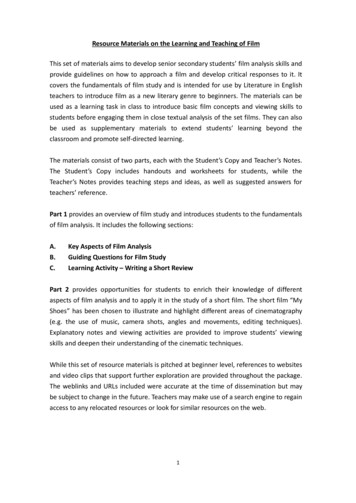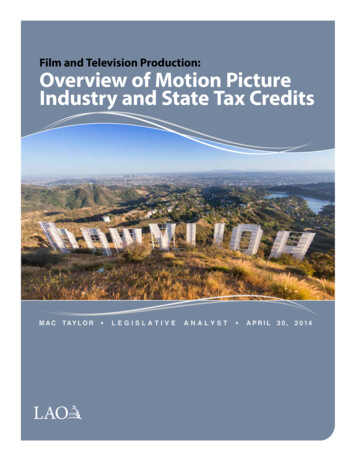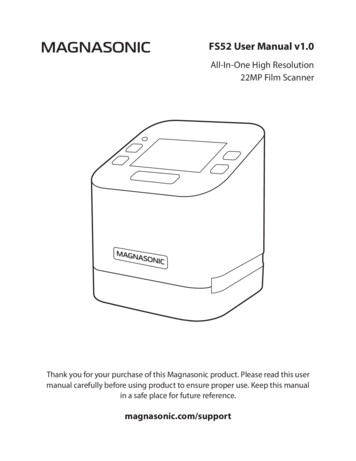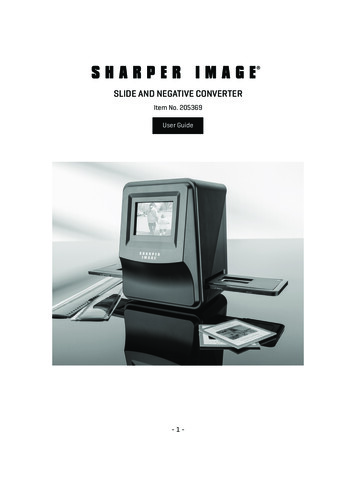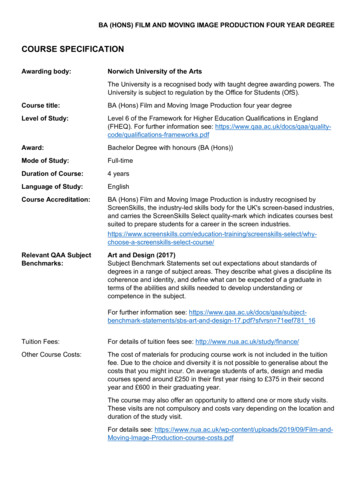
Transcription
BA (HONS) FILM AND MOVING IMAGE PRODUCTION FOUR YEAR DEGREECOURSE SPECIFICATIONAwarding body:Norwich University of the ArtsThe University is a recognised body with taught degree awarding powers. TheUniversity is subject to regulation by the Office for Students (OfS).Course title:BA (Hons) Film and Moving Image Production four year degreeLevel of Study:Level 6 of the Framework for Higher Education Qualifications in England(FHEQ). For further information see: cations-frameworks.pdfAward:Bachelor Degree with honours (BA (Hons))Mode of Study:Full-timeDuration of Course:4 yearsLanguage of Study:EnglishCourse Accreditation:BA (Hons) Film and Moving Image Production is industry recognised byScreenSkills, the industry-led skills body for the UK's screen-based industries,and carries the ScreenSkills Select quality-mark which indicates courses bestsuited to prepare students for a career in the screen lls-select-course/Relevant QAA SubjectBenchmarks:Art and Design (2017)Subject Benchmark Statements set out expectations about standards ofdegrees in a range of subject areas. They describe what gives a discipline itscoherence and identity, and define what can be expected of a graduate interms of the abilities and skills needed to develop understanding orcompetence in the subject.For further information see: atements/sbs-art-and-design-17.pdf?sfvrsn 71eef781 16Tuition Fees:For details of tuition fees see: http://www.nua.ac.uk/study/finance/Other Course Costs:The cost of materials for producing course work is not included in the tuitionfee. Due to the choice and diversity it is not possible to generalise about thecosts that you might incur. On average students of arts, design and mediacourses spend around 250 in their first year rising to 375 in their secondyear and 600 in their graduating year.The course may also offer an opportunity to attend one or more study visits.These visits are not compulsory and costs vary depending on the location andduration of the study visit.For details see: ilm-andMoving-Image-Production-course-costs.pdf
BA (HONS) FILM AND MOVING IMAGE PRODUCTION FOUR YEAR DEGREEADMISSION REQUIREMENTSEntry Requirements / Interview/ Portfolio:When you apply to the BA (Hons) Film and Moving Image four year degree at NUA, we will ask you to sendin your portfolio digitally and a written submission. These methods are used to assess your suitability to thecourse. These elements should clearly demonstrate your passion for the subject and your individualcreativity.Detailed information regarding entry requirements and portfolio guidance can be found age-production/#tabs-portfolioguidanceAIMS AND OUTCOMES OF UNDERGRADUATE STUDYThe Aims and Outcomes of the Year 0 programme at the University have been developed with reference tothe descriptors for (a) the QCF Level 3, and (b) the FHEQ Level 4. Entry requirements for the University’sYear 0 programme include the satisfactory achievement of Level 3 qualifications. The academic standardsexpected of students who successfully complete the Year 0 programme therefore exceed QCF Level 3.Teaching, learning and assessment on the Year 0 programme are designed to provide students with furtherpreparation for one of the University’s undergraduate degree courses at FHEQ Level 4 (Year 1 ofundergraduate study).In defining the Year 0 programme at NUA, consideration has also been given to the QAA guidance paperInternational students - studying in the UK (January 2012) in designing programmes of study that recognisevariations in student expectation along with the benefits associated with diversity.The Aims of the Year 0 programme at the University are to: Provide an inclusive, supportive and stimulating learning environment to prepare students for thespecialist study of arts, design and media;Enable students to gain an awareness of the nature and scope of arts, design and media practice,context and theory;Provide students with opportunities for imaginative, exploratory and rigorous creative practice;Provide an educational experience that prepares students for further study;Provide courses that make students aware of their potential future contribution to social, economicand cultural life;Provide curriculum content which is current and takes into consideration the work of a range ofcontemporary creative practitioners.
BA (HONS) FILM AND MOVING IMAGE PRODUCTION FOUR YEAR DEGREEThe Aims of Undergraduate Study are to: Provide students with an inclusive and stimulating curriculum for the specialist study of art, design,architecture and media.Maintain and nurture a commitment to intellectual and personal development as a basis for alifetime of learning and professional practice.Provide students with opportunities for innovative, imaginative and intellectually rigorousopportunities for creative practice along with skills appropriate to the named award.To enable students to establish and develop key skills in areas of creative practice, research andprofessional practice as they apply to the subject.Provide students with the required practical and project management skills to realise ideas.Provide courses that prepare students for employment and professional practice and/or furtherstudy.Provide courses that enable graduates to make a useful contribution to the social, economic andcultural life of the region and beyond.Enrich curriculum content and ensure course currency through the professional practice, researchand scholarship of staff.Emphasise the cultural, technical and vocational relevance of course provision.Develop effective collaborations with the creative and cultural industries, professional bodies, otherHEIs and wider art, design, architecture and media communities.
BA (HONS) FILM AND MOVING IMAGE PRODUCTION FOUR YEAR DEGREEGENERIC SKILLSStudents who successfully complete a Year 0 programme at NUA will: Be able to work with increasing independence in an area appropriate to the relevant sphere ofcreative practice;Be able to work with some flexibility and to recognise change and uncertainty in practice;Have begun to develop a professional approach in working towards achieving their full potential asa creative practitioner;Be able to work collaboratively, having regard to the views and needs of others;Have developed the ability to make effective use of basic processes and materials appropriate tocourse requirements;Be able to work with due regard to Health and Safety procedures and apply them to their chosenarea of specialism or context;Be able to interpret and comment on their subject practice using spoken, written, spoken and visualmeans of communication.Holders of Undergraduate Awards will: Have developed the skills to embark on a professional career or further course of study in a relatedfield.Demonstrate a professional approach and work towards achieving their full potential as a creative ortechnical practitioner.Possess the qualities and transferable skills necessary for employment and progression to otherqualifications assuming personal responsibility and decision-making.Be digitally literate in relation to the skills essential for professional practice and its representations.Be able to locate their work within relevant professional, cultural and historical frameworks.Be able to practice professionally in an area appropriate to their subject skills and expertise.Have developed the capacity to critically examine the context within which their practice is based.Be able to analyse information and experience to formulate and present reasoned arguments.Have an understanding of the extent of their knowledge, and how this influences analysis andinterpretation based on that knowledge in their area of practice.Be able to interpret and communicate their practice using spoken, written and visual language.Be able to work flexibly to manage change and uncertainty.Be able to work independently and collaboratively while having regard to the views and needs ofother stakeholders.Have developed the ability to make effective use of processes and materials appropriate to thesubject.Be able to work with due regard to Health and Safety, Ethics, Sustainability and Risk Assessmentconsiderations as they apply in in a range of professional contexts.
BA (HONS) FILM AND MOVING IMAGE PRODUCTION FOUR YEAR DEGREECOURSE DIAGRAMBA0a: Introductory StudiesBA0b: Creative PracticeBA0c: Specialist Study10 weeks10 weeks10 weeksBA1a: Creative LearningBA1b: Explore and Experiment40 Credits80 Credits10 Weeks20 WeeksBA2a: Global ContextsBA2b: Collaboration80 Credits40 Credits20 Weeks10 WeeksBA3a: Research andPreparationBA3b: Resolution and Career Development40 Credits80 Credits10 Weeks20 Weeks
BA (HONS) FILM AND MOVING IMAGE PRODUCTION FOUR YEAR DEGREECOURSE OVERVIEWYou will be making films from week one and set-ready by the time you graduate when you join our BA(Hons) Film and Moving Image Production degree, accredited by ScreenSkills.We will encourage you to explore a variety of filmmaking mediums and platforms to become anaccomplished and creative storyteller.You’ll learn by doing as you become a flexible, multi-skilled collaborator with technical and craft skillshighly-prized by industry.You’ll explore how the production skills you use and creative choices you make can shape and change thestory you are telling.Script to screenYour focus will be the short film form, including:oOriginal and adapted dramaoDocumentaryoAdvertisingoCommercial editorial work.You’ll play a range of production roles as you learn fundamental skills, including:oScript writingoProducingoDirectingoCinematography and editingoSound recording and sound designoProduction design.Film production and releaseEntrepreneurial skills won’t take a back seat, as you pitch films to professional visitors, explore filmmarketing and distribution strategies, including festival and contest entries, as well as online platforms.And you’ll make full use of the industry networks associated with the course, attending craft workshops withleading writers, directors, producers, production designers, sound designers and cinematographers.The final year provides opportunities to write, produce or direct an original short film and submit it forselection for a special industry screening.There’s also the potential for international exposure through online screenings and NUA’s degree show.
BA (HONS) FILM AND MOVING IMAGE PRODUCTION FOUR YEAR DEGREEGraduates work in a broad range of careers including:ooDirectoroCamera OperatoroProduceroLocation ManageroDirector of PhotographyoArt DirectoroEditoroProduction DesigneroSound DesigneroScreenwriteroAssistant DirectoroScript SupervisorYou’ll also get specialist creative careers advice from our Careers Team in the Ideas FactoryNUA tohelp support you as you plan your career.
BA (HONS) FILM AND MOVING IMAGE PRODUCTION FOUR YEAR DEGREECOURSE CONTENTYear 0 Learn fundamental skills that are essential to any of our degree courses Specialist workshops in your chosen course where you will immerse yourself in the creativeprocesses and key skills, building your confidence, within your chosen course of study Balance the new creative skills you’ve acquired with thinking skills and work more independently. Start to develop your own style or approach by building on your emerging practical skills andgrowing expertise in research, questioning and ideas development.Year 1 Develop your storytelling skills and your fundamental creative craft skills such as producing, scriptdevelopment, direction, cinematography, sound, editing and colour grading. Learn industry standard approaches to the filmmaking process including pre-production, productionand post-production Work in production teams on a range of practical projects including visual narrative, dramaadaptation, sound design and production design Interview and write a case study about a person currently working in the film industry Produce individual supporting research and documentation in the form of a research and preproduction blogYear 2 Further develop industry awareness and storytelling skills, working on briefs with industry clientsand experts Consolidate skills and knowledge in the wider context of film forms, including documentary andadvertising films, alongside different forms of drama Develop collaborative working skills on projects with students on other courses, as well as workplacement opportunities and live industry projectsYear 3 Produce, direct, shoot and post-produce a short film Receive feedback and advice on your film from a panel of professionals working in the film industry Receive support to develop a five-year employability plan, including plans to seek out industryplacements, internships, mentors and employment, as well as ways to develop your final film forfestival (contest) submission Write a Research Report on an area of film production, culture or audience that reflects yourinterests.
Year 0 Unit: BA0aUnit Title:Introductory StudiesReference:BA0aYear:0Duration:10 WeeksStudy Time:320 HoursYEAR 0 UNIT: BA0aDescriptionThis Unit is designed to help you to develop the practical skills and awareness of processes and researchmethods that are fundamental to developing a sustainable creative practice. You will be encouraged todevelop a questioning and experimental approach to both your practice and thinking. Adapting to theworking patterns and the level of enquiry, required for University study, can be difficult and this Unit willenable you to establish the tools and methods to navigate your studies successfully. Key to the success ofthis Unit is the ability to test, question, record, and develop responses to the projects set, and to allow ideasto emerge from a process of experimentation, reflection and editing. Seldom is the first idea the best ideaand you will be encouraged to explore your work from multiple directions, allowing you to arrive at the bestsolution for any given problem. You will also be introduced to the mapping skills that will allow you todevelop an understanding of the context of your emergent work that will lay the foundation for furtherstudying and career goals.In the initial stages of the Unit you will also gain an understanding of the importance of visualisation skillswithin the creative process, as a means to generate, develop, and communicate ideas. Within this Unitthere are a number of creative workshops that will introduce you to key ideas and working processes, bothpractically and conceptually. You will also be introduced to a range of different technical workshopsthroughout the University, through a series of timetabled inductions. Projects will be informed by aprogramme of research seminars, with an accompanying portfolio of research tasks, referencingconceptual skills and the work of individuals and movements across a broad terrain of contemporary art,design, architecture, performance and media practice.Indicative SyllabusCreative Practice An introduction to a range of processes and key skills central to idea generation and the iterativecycle. Establishing time-management skills through a range of workshops, group critiques and tutorialsupport Workshops and group activities to facilitate supporting practical and written work through the use ofdocumented and annotated development work, and the reflective journal. The development of conceptual and practical skills through workshops and independent study. Workshops to facilitate the recognition of risk and not knowing as part of the iterative process. An introduction to techniques of enquiry, questioning and reflection. Health and Safety inductions to ensure safe working practices within the University environment.
YEAR 0 UNIT: BA0aResearch and Communication An introduction to the interchange between practice and theory. An introduction to the work of art, design, architecture, performance and media practitioners. Workshops and tutorial support to introduce the development of visual and textual research skills. Building confidence in discussing your own work and the work of others through workshops andgroups critiques. Developing skills in presenting information through written, visual and oral presentation, throughworkshops and tutorial support. An introduction to the University facilities and learning environment, including Library and onlineresources.AimsThe aims of the unit are: To develop techniques of creative enquiry, questioning and reflection To develop skills, confidence and awareness in relation to practice and theory. To develop research skills for visual, oral and written work. To build knowledge and awareness in relation to contemporary/historical art, design, architecture,performance and media practice. To develop ability in the use of and choice of appropriate media and/or performance and technique.Learning OutcomesUpon successful completion of this unit, you will be able to:LO1: Apply and understand appropriate creative methods within practice.LO2: Engage with the development of creative work through a process of experiment and refinementand reflect effectively upon development.LO3: Employ research strategies to develop reference material for visual, oral and written work.LO4: Identify and critically examine key issues in contemporary/historical art, design, architecture,performance and media practice.LO5: Demonstrate ability and skill in the selection and manipulation of media and/or performance andtechnique.
Assessment RequirementsYEAR 0 UNIT: BA0aYou are required to submit the following for assessment: A Body of Creative Practice, including outcomes from the workshops and set projects. Collated and annotated Supporting Documentation that includes visual and textual sourcessupporting creative practice, accompanying documentation of development. Evidence of reflection that uses the Reflective Templates available on the VLE. There should be aminimum of eight completed Reflective Templates – four for each project. A collated 1000 word ‘Zine’ that brings together weekly set research tasks emerging from researchlectures and seminars
Year 0 Unit: BA0bUnit Title:Creative PracticeReference:BA0bYear:0Duration:10 WeeksStudy Time:320 HoursYEAR 0 UNIT: BA0bDescriptionWithin this Unit you will use and build upon the skills acquired within BA0a to begin to develop your creativelanguage, continuing to use key techniques of research, questioning, ideas development and realisation.You will be asked to consider what it is that you would like your work to communicate and how you can useprocess, media and context to manipulate modes of communication. It is at this time that you will either,further ally yourself within you chosen area of study, or seek to move into course areas that best reflectyour interests. You may begin to wonder whether your initial choice of course was the right one. If this isthe case, it is within this Unit you may negotiate with tutors your future specialism, as you enter into thenext Specialist Study Unit. Should you seek to renegotiate your course of study you will need to satisfy thecourse team of your chosen course that you are in good academic standing and that your work supportsthe case for course transfer. The option for course transfer will not be available in unit three, SpecialistStudy.As a creative community we are taking on more social responsibility and action, when it comes to issues todo with sustainability. As a term this is rather difficult to describe without imposing limits, but it includes notonly the environment, but also health and welfare, education, social justice, culture and economiclivelihood. Creative practitioners are using emergent work to send a message, either by its sourcing ofmaterial, its production, distribution, or the message conveyed. You are encouraged to consider yourposition on these issues and how you and your work navigates them. Further to this, you will continue toextend your knowledge and understanding of the contextual references that surround your practice andyour chosen discipline. Contextual research will inform your work, feeding your ideas.The unit is designed to allow you to interpret set projects from your own creative position, enhancing yourengagement in the development of your ideas and the way that you choose to express them. It is alsowithin this Unit that you will begin to learn more independently, further utilising time management, and selfreflection skills. These key skills will form the foundation upon which you will continue to develop withinsubsequent years of study. Through this unit you will be encouraged to further define the context in whichyou situate your practice, both in terms of realising the work, and how it is received by an audience of peersand others. As with the first Unit, projects will be additionally enhanced by a programme of researchseminars, with an accompanying portfolio of research tasks. These seminars will expand upon thereferences, key concepts and movements across more focused contexts within contemporary art, design,architecture, performance and media practice, so as to best reflect your chosen area of study.
Indicative SyllabusYEAR 0 UNIT: BA0bCreative Practice Workshops to facilitate the continued development of a practice that is informed by enquiry cycles,contextualisation and reflection. Workshops to encourage a developing ability to pose practice-based research questions and toexplore questions posed. Extending your independent learning, through skills in time management, organisation andnegotiation, as developed through workshops and tutorial support. Workshops and tutorial support to encourage further consideration towards the relationship betweencreative intent and realisation, and the significance of audience. Further development of reflective processes and annotated documentation to support practice,through workshops and tutorial support. Health and Safety inductions to ensure safe working practices within the University environment. Opportunities to negotiate course specialisms, through tutorial and interview with respective courseteams.Research and Communication Workshops and tutorial support to facilitate the development of skills to contextualise and analyseinformation for practice and research. Workshops to facilitate a developing understanding of the interchange between practice and theory. Building contextual knowledge of subject specialist art, design, architecture, performance and mediapractitioners through taught workshops and tutorial support. An introduction to online research resources, subject specific journals and texts. Workshops to encourage the selecting and editing of relevant primary and secondary research forpractice. Writing for an art, design, architecture, performance and media practice including the use ofrelevant to critical source and citations. Workshops to develop an understanding of academic conventions within written work andpresentations.AimsThe aims of the unit are: To enable the development of an individual creative practice through effective time-managementand organisational skills. To develop personal creative work with consideration towards intent, outcome and contexts. To further develop a creative practice that is centred upon research, experimentation and reflection. To develop an ability to communicate intended ideas and themes, through visual, oral, written work,and verbal critique. To establish and build upon a developing critical and contextual understanding surroundingemergent practice.
YEAR 0 UNIT: BA0bLearning OutcomesUpon successful completion of this unit, you will be able to:LO6: Manage time effectively in developing your own visual language.LO7: Demonstrate ability and skill in the realisation of a creative body of work relative to creativeintent.LO8: Apply skills in research, experimentation and reflection, in developing and realising a body of work.LO9: Communicate ideas and themes through visual, oral, written work, and verbal critique.LO10: Demonstrate an emergent critical and contextual understanding about your own practice.Assessment RequirementsYou are required to submit the following for assessment: A Body of Creative Practice, including outcomes from set projects. Collated and annotated Supporting Documentation that includes visual and textual sourcessupporting creative practice, accompanying documentation of development work, and evidence ofreflection. A Portfolio of Research Tasks, emerging from research lectures and seminars. A 1500 Word essay.
Year 0 Unit: BA0cUnit Title:Specialist StudyReference:BA0cYear:0Duration:10 WeeksStudy Time:320 HoursYEAR 0 UNIT: BA0cDescriptionThis Unit continues to build upon the skills and knowledge initiated in BA0a and BA0b. You will continue towork with staff and students from your chosen course of study.In this respect, the Unit focuses upon specialist aspects of arts, design, architecture, performance or mediapractice. You will be asked to pose your own research questions, map your practice thematically andcontextually and navigate set projects from you own areas of specialism. At this stage you will have begunto establish the early building blocks of your creative practice, utilising practical skills, skills in reflection andcontextualisation. You will be encouraged to engage iterative processes from within your chosenspecialism, demonstrating a willingness to test, edit and refine your work through to resolved outcomes.You will also be asked to make good use of self-evaluation and feedback to support you through theprocess of development and improvement as you seek to best express your ideas.As part of this Unit, you will also be required to demonstrate knowledge of contemporary, historical andcritical concepts, relevant to your subject specialism, to inform and to build upon a contextual frameworkabout your practical work. You will also be asked to considered different aspects of sustainability, thesocial, political, cultural and environmental concerns surrounding making work in today’s creative contexts.Increasingly, issues around sustainability may impact or influence your work as you consider how aspectsof social conscience might be communicated through your work, and the contexts within which it is placed.You will be asked to consider your position upon these and related contexts, thus demonstrating both asocial and an ethical awareness. Navigating these historical and contemporary issues can sometime bedifficult and in order to be able to do this you will be supported by weekly research seminars. As youprogress through the unit you will be asked to articulate concepts and contexts within your SupportingDocumentation and within your Ten Minute Presentation, towards the end of the Unit. Following eachweekly session, you will be set a research task, which will reflect the ideas discussed within the researchseminars. You are asked to compile these tasks, handing in a Portfolio of Research Tasks at the end of theunit.This Unit builds upon your development readying you for entry into Year 1 of your chosen course of study.
Indicative SyllabusYEAR 0 UNIT: BA0cCreative Practice Workshops and group activities design to facilitate a developing ability to utilise a range of media,contexts and processes relevant to specialist subject practice. Further inductions in a range of subject-specific technical workshops. Workshops to facilitate the further development of independent research skills and enquiry-ledlearning in the development of visual, oral and written work. Further workshops and tutorial support to emphasise the importance of recording, reflecting uponand evaluating your own development and progress. Further developing skills and ability to realise creative outcomes relative to specialist subject andcontexts through creative and technical workshops, and tutorial support. Further development of project management skills through workshops and tutorial support.Research and Communication Developing an awareness of the contexts and contextual references relative to specialist subject,through taught workshops, seminars and tutorial support. Further developing and utilising an understanding of the interchange between practice and theorythrough workshops, seminars and tutorial support. Further developing an ability to locate and analyse key contemporary, historical and criticalconcepts for an art, design, architecture, performance or media practice, relevant to specialistsubject, through workshops, seminars and tutorial support. Workshops and tutorial support to facilitate an ability to assimilate research and present informationthrough oral presentation. Developing skills to question, contextualise and analyse information for subject specific contextsthrough workshops, seminars and tutorial support.AimsThe aims of the unit are: To encourage independent research skills and enquiry-led learning in the development of creativework, within subject specialism. To develop an ability to use self-evaluation and critical reflection to benefit personal and practicalwork through developmental cycles. To encourage independent research skills and the understanding of the historical and criticalcontext of your practice. To develop an ability to utilise a range of media, contexts and processes in realising a body ofcreative work, relevant to specialist subject. To develop an understanding and ability to articulate the contexts and contextual referencesrelevant to specialist subject. To develop skill in managing creative process through to project realisation.
Learning OutcomesYEAR 0 UNIT: BA0cUpon successful comple
Awarding body: Norwich University of the Arts. The University is a recognised body with taught degree awarding powers. The University is subject to regulation by the Office for Students (OfS). Course title: BA (Hons) Film and Moving Image Productionfour year degree . Level of Study:
